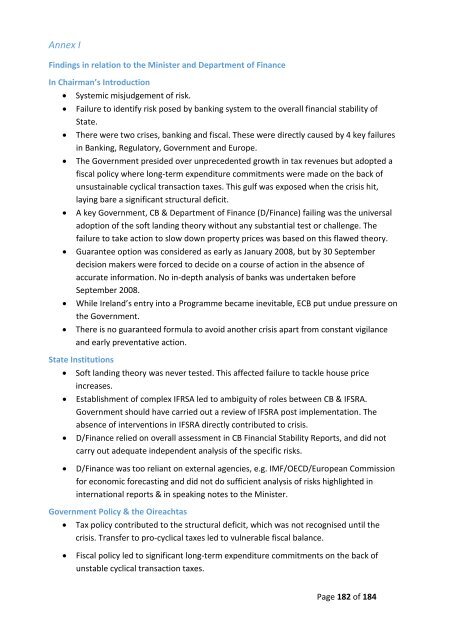Minister’s Brief
20160229%20Minister%20for%20Finance%20Brief%20redacted%20web
20160229%20Minister%20for%20Finance%20Brief%20redacted%20web
You also want an ePaper? Increase the reach of your titles
YUMPU automatically turns print PDFs into web optimized ePapers that Google loves.
Annex I<br />
Findings in relation to the Minister and Department of Finance<br />
In Chairman’s Introduction<br />
Systemic misjudgement of risk.<br />
<br />
<br />
<br />
<br />
<br />
<br />
Failure to identify risk posed by banking system to the overall financial stability of<br />
State.<br />
There were two crises, banking and fiscal. These were directly caused by 4 key failures<br />
in Banking, Regulatory, Government and Europe.<br />
The Government presided over unprecedented growth in tax revenues but adopted a<br />
fiscal policy where long-term expenditure commitments were made on the back of<br />
unsustainable cyclical transaction taxes. This gulf was exposed when the crisis hit,<br />
laying bare a significant structural deficit.<br />
A key Government, CB & Department of Finance (D/Finance) failing was the universal<br />
adoption of the soft landing theory without any substantial test or challenge. The<br />
failure to take action to slow down property prices was based on this flawed theory.<br />
Guarantee option was considered as early as January 2008, but by 30 September<br />
decision makers were forced to decide on a course of action in the absence of<br />
accurate information. No in-depth analysis of banks was undertaken before<br />
September 2008.<br />
While Ireland’s entry into a Programme became inevitable, ECB put undue pressure on<br />
the Government.<br />
There is no guaranteed formula to avoid another crisis apart from constant vigilance<br />
and early preventative action.<br />
State Institutions<br />
Soft landing theory was never tested. This affected failure to tackle house price<br />
increases.<br />
<br />
<br />
Establishment of complex IFRSA led to ambiguity of roles between CB & IFSRA.<br />
Government should have carried out a review of IFSRA post implementation. The<br />
absence of interventions in IFSRA directly contributed to crisis.<br />
D/Finance relied on overall assessment in CB Financial Stability Reports, and did not<br />
carry out adequate independent analysis of the specific risks.<br />
<br />
D/Finance was too reliant on external agencies, e.g. IMF/OECD/European Commission<br />
for economic forecasting and did not do sufficient analysis of risks highlighted in<br />
international reports & in speaking notes to the Minister.<br />
Government Policy & the Oireachtas<br />
Tax policy contributed to the structural deficit, which was not recognised until the<br />
crisis. Transfer to pro-cyclical taxes led to vulnerable fiscal balance.<br />
<br />
Fiscal policy led to significant long-term expenditure commitments on the back of<br />
unstable cyclical transaction taxes.<br />
Page 182 of 184


